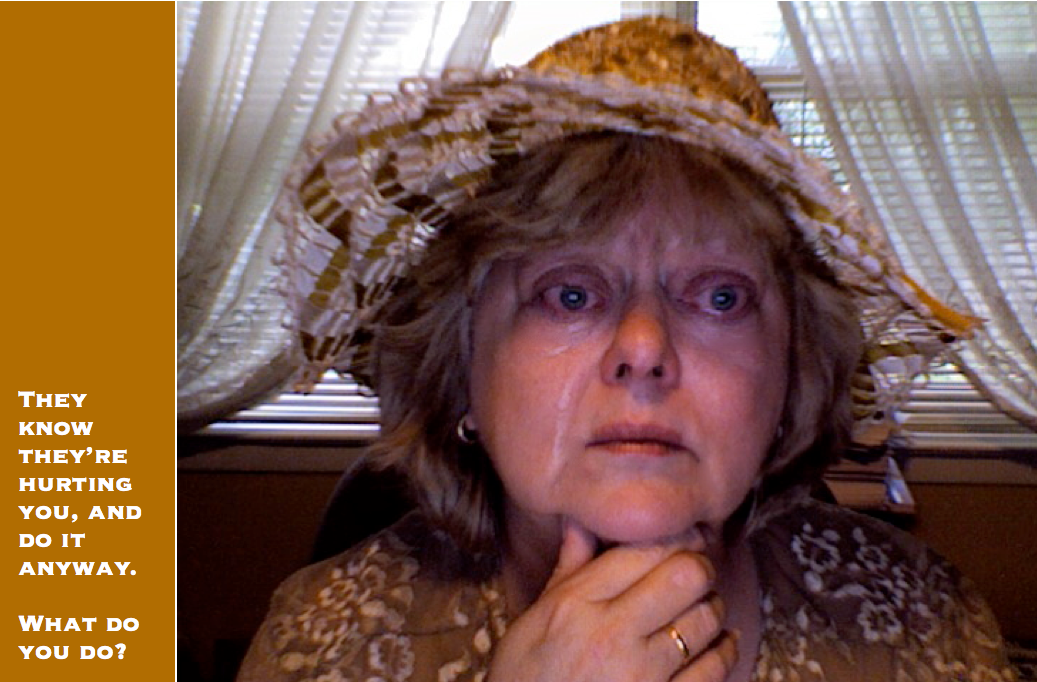Recently Dr. David Jeremiah preached an impassioned sermon on mercy and grace. He noted that they often appear in the Bible together. That got me to thinking about them separately and jointly in a way I hadn’t previously connected them.
That we deserve what we get, and sooner or later get what we deserve, is why mercy is so important–and why we should be grateful God grants it to us.
That we don’t get all we deserve, though we’ve earned it (you reap what you sow), is why grace is critical to us–and why we should be grateful that God grants it to us. It’s humbling. Really.
Whether or not we start out with offenses in mind, we all commit them. Sometimes small ones, sometimes large ones. And sometimes we don’t see the ripple effect or feel the full impact of our infractions. On occasion, we experience the full fallout and suffer the full consequences, but equally often and perhaps more so, we are spared that full weight. That’s mercy and grace in action.
Mercy because we are responsible for what we do, and grace because if we had to bear that full weight and all of those consequences, most of us would be crushed under it. Certainly, we’d suffer far more broken spirits than we do. I suspect we’d keep the psychiatrists hopping, too.
The truth is that few of us feel we deserve mercy. We don’t always give our best, do our best, try our hardest to walk the walk in faith. We could do better, try harder. We could do more right and live more holy lives than we actually live.
I remember once–I was maybe ten–bringing home my report card. Before my dad removed it from the envelope and looked at it, he said, “No matter what this says, if you did your best, then I’m proud of you.” Wasn’t that a wonderful thing for a parent to say?
Well, I wasn’t proud. I was ashamed. Why? Because I knew I hadn’t done my absolute best. I hadn’t studied much, done anything over and above what was required. Truthfully, I’d coasted. Shame’s bad. But when guilt is chasing its heels, it’s even worse. I had a double dose of both, and I knew there was no way I could look my dad straight in the eye and tell him I’d done my best. So I fessed up, sheepishly admitted I could have worked harder.
Pensive, he opened the envelope. I didn’t know what to expect but I knew his disappointment would be involved and I really didn’t feel good about that.
He was surprised. I had all As but one was an A-. He didn’t seem disappointed. He seemed happy with my grades, but I wasn’t happy with myself. I knew I’d been a slacker, and I felt like a slug.
You see, it didn’t matter that my grades were good. That wasn’t significant. That I was capable of better and didn’t do it–that was the sticky wicket–and that’s my point. I chose to go the easy route rather than the best route.
My dad was gracious. As I recall, about all he said was something like, “Well, Tiger, I trust that next six-weeks you’ll give it your best.” I assured him I would, and that was that. At least, insofar as he was concerned. But that feeling of shame and guilt, of settling for less, haunted me. I didn’t like the way I felt about me, and I didn’t want to feel that way again. So the next six weeks, I gave it my best.
And that, too, is the point. God does shed His grace on us and He is merciful. But we still have to work at it to give ourselves moments of grace and mercy. True, He’s had a lot more practice at granting both, but that doesn’t absolve us. Taking our cues from Him, we should be responsible for our acts and when we goof, then we should honor Him by doing what we can to right the wrong and then by being merciful and bestowing our own grace on ourselves. We emulate God in this way, and that honors Him. Humbling, isn’t it?
When we look at our thoughts, actions and deeds, even on our best days, we have times when we just don’t deserve mercy. We’ve earned every bit of what we expect to get. We don’t want it, we wish and hope it away, but we know payback coming and that we’ve got to suck it up and endure it because we brought it to bear. And yet it doesn’t come. We’re spared. We don’t deserve it–can hardly believe it–but God has shown us mercy.
Maybe He, having the broadest picture and deepest understanding, knows we couldn’t take it. We’re told we’re tested to perfect us, not to break us. Or maybe we got the point without trudging through our own sludge. Maybe we’ve repented and turned away from those wrongs without feeling the brunt of those consequences, which would, in a way, make them redundant. Or maybe God spared us because He is that indulging father who loves us and He can spare us suffering. I expect His reasons are even more varied than our own for sparing our children when they make mistakes or do things they know are just plain wrong but do them anyway.
I don’t know all the reasons, and I doubt any mortal does. But I believe with my whole heart that love is the foundation for any decision to show either mercy or grace.
Why do I feel so certain of that?
Because no mortal has ever earned grace. No human being can because grace, by its very nature, cannot be earned. It’s a gift. A gift God gives us because He chooses to give it, not because we’ve earned it. So if we don’t deserve it, can’t demand it, and it’s a gift, and if we look at some of the horrific things we do where we need mercy and/or grace, then granting it must be seated in love. What else exists that is powerful enough, enduring and capable of sustaining enough, to be the foundation for gifts of this magnitude? Nothing else comes close.
So then, I’m concluding that mercy is a gift God grants to us for those things we do that we shouldn’t do. And grace is a gift God grants to us for those things we should do and don’t do.
Before Dr. Jeramiah’s sermon, I’d never before looked at grace and mercy as a unit, and yet as soon as he uttered the words, they resonated with me as a profound truth. I’m grateful for that.
It’s too easy to imagine a world where there is no mercy. Where we all pay full price for each act we commit, each word we say–without exception or pardon–and where we pay full price for each act we fail to commit, for all those words we should but elect not to say.
It’s far too easy to imagine. Chilling, actually. I don’t think any of us could bear it.
Which shows yet another instance of how wise and merciful God is to us. And yet another example of His grace. Such a potent example that it’s difficult to feel sufficiently humble.
And for the thousandth time in recent memory what I most feel is awe.
Blessings,
Vicki
c2008, vicki hinze




